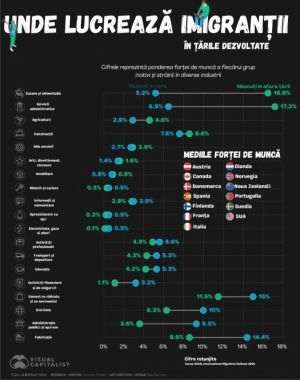Artificial Intelligence is increasingly used by the industry of services offered to businesses, because the use of this technology brings added value to the activity of companies and increases their competitiveness, said yesterday, the participants at the 11th annual conference of the Business Service Association Leaders (ABSL), an event that this year had as its main topic of debate how AI impacts the activity of companies and citizens (Humans and/versus Machines - AI it's what we make of it).
At the opening of the event attended by 600 representatives from over 100 companies, Ciprian Dan, president of ABSL, said: "If we look carefully at the last years, we experience mixed feelings. We are dealing with two wars - the one in Ukraine and the one in Israel - which have affected supply chains and driven up prices in energy and other areas. On top of these issues, companies have also been hit by rising inflation, rising bank interest rates and recent legislative changes that have added to the challenges the industry has had to face. That is why the use of AI is a topic that we need to debate, because beyond the competitiveness issues it raises, it is a challenge for predictability and for the digitization of activities. Artificial Intelligence has started to transform the activity of some companies, there are companies that have embraced the new technology, but there are also companies that have not yet made a decision about its use. AI is the future for some companies, but it may just be a buzzword for others. There is no doubt that AI will change the world as companies of all sizes rely more on data to make strategic decisions. AI technology is undoubtedly one of the core pillars of this digital transformation. It is rapidly making its way into processes in all industries, driving organizational change and technological developments. Few would argue that AI will not directly change the way we live and do business, although the extent remains unknown. The conversation about artificial intelligence and the workplace is understandably dominated by the downside - after decades of automation wiping out manufacturing jobs, people in the service sector are wondering how their jobs will be affected. Certainly every technological change creates and destroys jobs. Artificial intelligence - at least in its current form, which uses large sets of language data to create text, audio and video - is no different. What is perhaps interesting is the type of jobs it will create. (...) If developed responsibly, artificial intelligence can be a powerful tool to help deliver a better and fairer future for all societies. (...) Beyond doubt, during this year we recorded a high number of investments in the field of digital services in Romania, an increase in the complexity of the services offered that generated added value, but also an increase in businesses, income and the number of business on the whole industry".
• Romania, second place in Europe in the business services industry
ABSL's annual report for the entire business services industry confirms Ciprian Dan's claims. According to the data presented by Francesca Postolache, PwC partner and Oana Munteanu, People&Organization director at PwC, Romania, with more than 1000 entities that offer business services, has become the second market in Europe after Poland, which counts 1750 companies.
Francesca Postolache stated: "We are talking about a European market of 3 trillion euros. 77 companies out of the 1000 existing in our country participated in the report prepared by us. The 77 companies have a total of 55,000 employees and represent 16% of the total turnover of the 1000 companies in the field. We found that revenues increased by 19% in 2023 compared to 2022, the number of employees increased by 10%, and 10% of employees cover the business of a company carried out in 2 or 3 work points in the country. The report also shows that the priorities of the service market are automation, development of management and centers of excellence, as well as ensuring good governance. For next year, 64% of the companies included in the report estimate an increase in the ongoing business, while 94% of these companies believe that Romania is a good place for investments. However, the representatives of the companies also identified potential risks, and these consist in the availability of talent, in taxation and environmental legislation, as well as in the political and economic environment".
• 12,637 lei - monthly average salary in the business services industry
IT companies that provide services for various businesses in our country have a high level of average salary compared to other economic sectors, according to the report presented at the event.
Oana Munteanu said: "Regarding the labor market in this field, the three main skills sought by employers are technical skills, digital skills and automation, and knowledge of a foreign language. Regarding the age of the employees, its average is approximately 33 years, which shows experienced staff, but we noticed a reduced mobility in this field of activity, which we attributed to the slowdown of the economy. Regarding salaries, only 57 of the 77 companies in the report provided data on the average salary offered, which this year amounts to 12,637 lei per month, which represents an increase of 9.03% compared to 2022. Moreover, companies estimate a 7% increase in the average salary for 2024, the increase being lower than the one expected before the intervention of the latest legislative changes. We note that all 57 companies increased wages. The highest average salary in the field is in Bucharest - 12,900 lei. Nearby is the Transylvania-Banat area, where the employees of the companies in the report have an average monthly salary of 10,300 lei, followed by Muntenia with 8,200 lei and Moldova with an average monthly salary of 7,900 lei. In the field of IT operations, salaries are between 15,400 lei monthly and 19,900 lei depending on the sector. Regarding non-operational activities, the average monthly salary is between 11,200 lei - in the financial area, 13,000 lei - in the marketing area and 13,400 for project managers. 45% of companies that provided payroll data claim they offered flexible benefits to employees."
Mrs. Munteanu also showed that all companies have a hybrid work schedule - from the office and from home and that 26% of the companies' employees work only from home.
• 43% of workplace tasks performed by machines using AI
Regarding the use of AI, Sorin Popescu, vice president of Genpact, which is a business management consulting firm, said that the new technology is different from classic machines and robots.
Sorin Popescu stated: "We are used to saying that people do creative, empathetic things, and machines only do programmed things. But AI, machines that use AI can do creative things and they can do empathic things. Recent research shows that in healthcare patients prefer to interact with machines rather than other people. We are already working on this future, but we are not sure what people will do better and how machines will work better. We will see if each will perform their own tasks individually, in isolation, or if people will interact with machines, each with a well-defined number of tasks. For now, the future is uncertain."
Regarding the objectives achieved in the workplace, Paul Soare, vice president of the company Genpact mentioned that so far in the year 2023 almost 43% of the tasks have been done by machines compared to 34% in the year 2022, while the year currently only 57% of tasks were performed by humans, compared to 66% last year.
Paul Soare stated: "2023 was the best year in terms of technology development. (...) All projects were better, smarter than last year and created an emulation in terms of technology. We have to be careful with the use of new technology and especially where we apply it. We observe that a strong driver in the use of AI is represented by increased productivity. However, we believe that it must be combined with the addition of added value and that AI needs to be used responsibly. I believe that we are not dealing with a process of man versus machine, but man collaborating with the machine. Can machines be more efficient than humans? It is possible, but people need to cooperate with them to develop skills and competencies. AI can be scary, but it's also an essential support."
• General Ben Hodges: "The technology works, but it's the human interpretation that gives the wrong information"
Related to the efficient use of machines and the information provided by them, new technologies and Artificial Intelligence, US General (retired) Ben Hodges, a specialist in logistics, stated that many times the technological systems worked very well, but people - specialists or officials - they misinterpreted the data provided.
He presented as examples of this the way Russia has behaved since 2014 with Ukraine and the way Hamas attacked Israel on October 7, 2023.
Ben Hodges said: "The war now going on in Ukraine is the result of our inaction and reducing military spending in Europe and the US. For example, if during the Cold War the number of American soldiers present in the Federal Republic of Germany was 300,000, now in all of Europe we have 30,000 American soldiers, ten times less. (...) In 2014 Russia captured Crimea and we did nothing, like we did nothing to prevent what happened on January 6, 2020 at the Capitol in Washington D.C. Russia saw this. Moreover, he also saw the misunderstandings within NATO, from the time of President Trump, between the US on the one hand and Germany and France on the other. That is why he decided to finish the job he started in 2014 in Ukraine and invaded that country in February 2022 with two goals: the destruction of Ukraine and the dissolution of NATO. We were not prepared for this, just as we were not prepared for what came after, when we had to explain to citizens why more money was needed for armaments and military mobility infrastructure, instead of prioritizing investments in Education and Health. (...) The same with what is happening in Israel. I think the problem with Israel being surprised by the Hamas attack on October 7, 2023 was their overconfidence in technology, in surveillance, monitoring systems, on the border with the Gaza Strip. The systems transmitted video images of anomalous activities in the border area three weeks before and during them, but no one took them into account. All the signs were there, the technology worked, but it was human interpretation that gave the wrong information. That's why we must not refuse to believe what we see because anything can happen".
The American general specified that the situation in Israel does not benefit the terrorist group Hamas, which in his opinion will not be destroyed as ordered by Israeli Prime Minister Benjamin Netanyahu, but the main beneficiary is Vladimir Putin because the attention of political leaders at the global level has been diverted by to allocating the necessary resources to Ukraine for the defense of the territory against the Russian Federation.
Ben Hodges also stated that the Black Sea region is one with huge economic potential on the east-west corridor towards the center of Europe, that our country and Turkey represent the most important states in this area and that Romania is a perfect place for investment projects.
Ben Hodges said: "We're coming here for the long haul. The US has approved a strategy on the Black Sea and we rely on Romania to implement it, because Turkey does not trust us even though we are partners in NATO, and in Georgia there is a persistent fear of political instability supported by the Russian Federation. The strategy regarding the Black Sea area includes large economic investments, not just the deployment of military capabilities".
The event participants also discussed the latest developments in artificial intelligence, how the combination of economic, political, demographic, technological and environmental factors are reshaping globalization and supply chains with impact on the future and presented practical examples of the use of AI.





























































